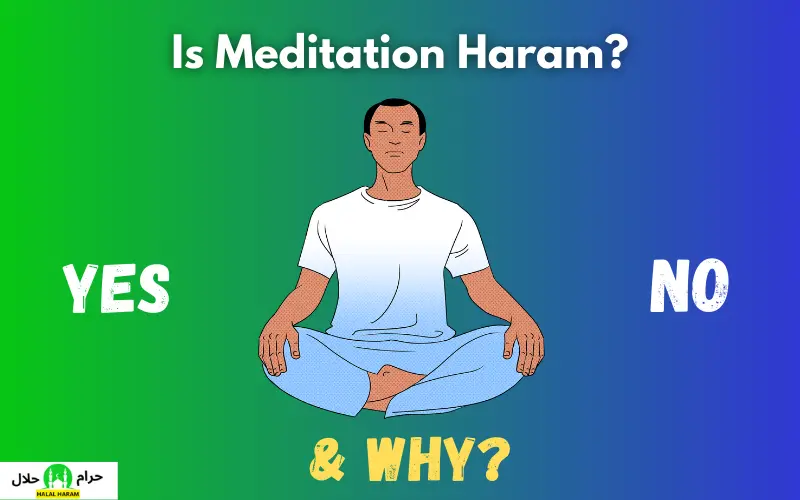Is Meditation Haram Or Halal In Islam?
Meditation is a practice that has been around for thousands of years and is rooted in many different cultures and religions.
It involves the use of techniques such as mindfulness, breathing exercises, and self-reflection to achieve a state of inner peace, relaxation, and mental clarity.
There are many benefits associated with meditation, including reduced stress and anxiety, improved focus and concentration, and increased self-awareness.
However, for Muslims, there may be a question of whether or not meditation is allowed in Islam or if it goes against the teachings of our religion.
If you’re searching is meditation haram, this blog post will explore the topic in more detail and provide a clear understanding for Muslim audiences.

Is Meditation Haram?
The short answer is no, meditation is not haram in Islam. Many references in the Quran and the teachings of Prophet Muhammad (peace be upon him) encourage Muslims to engage in self-reflection and contemplation.
In Surah Al-Baqarah, verse 152 it says, “So remember Me; I will remember you. And be grateful to Me and do not deny Me.” This verse highlights the importance of remembering God and being mindful of our actions, thoughts, and intentions.
Similarly, in Sahih al-Bukhari, Prophet Muhammad (peace be upon him) is reported to have said, “The best form of worship is meditation.” This hadith emphasizes the value and significance of meditation in Islam.
However, if you do meditation to seek guidance or help from anything other than Allah, then it can become haram. Also, if you do it because other religion practices it, then it becomes haram.
And saying words like “Ohm” or other mantras that are associated with other religions should be avoided as well.
Before you start practicing meditation, it is important to have the right intention and purpose in mind to connect with Allah and improve yourself as a Muslim.
So let’s first understand what is meditation and the different types of meditation that are common.
If you’re a man you should know is it haram to wear rings as a man.
What Is Meditation?
Meditation is a mental exercise that involves training and focusing the mind on a particular thought, object, or activity to achieve a state of inner peace and relaxation.
It is often practiced in a quiet and calm environment, with eyes closed and deep breathing as the initial steps to help clear the mind.
There are various types of meditation, including mindfulness meditation, mantra meditation, and breathing meditation.
Mindfulness Meditation
Mindfulness meditation is about being fully present in the moment and paying attention to your thoughts, feelings, and surroundings without judgment.
It involves focusing on your breath and acknowledging any distractions or wandering thoughts that may arise. The key is to observe these thoughts without getting attached to them and then gently bring your attention back to the present moment.
Mantra Meditation
Mantra meditation involves the repetition of a word or phrase, often in Sanskrit, to help focus the mind and evoke a sense of calmness and intention.
In Islam, instead of using mantras from other religions, we can recite verses from the Quran or dhikr (remembrance) such as saying subhanAllah (glory be to Allah), alhamdulillah (praise be to Allah), or Allahu Akbar (Allah is the greatest).
Breathing Meditation
Breathing meditation focuses on deep and controlled breathing, which can help calm the mind and relax the body.
It involves taking slow and deliberate breaths while being aware of the inhales and exhales, and any sensations that may arise in the body.
Also see is social media haram.
Benefits Of Meditation For Muslims
As mentioned earlier, meditation has numerous benefits for both physical and mental well-being. In addition to reducing stress and anxiety, here are some ways it can benefit Muslims specifically:
Increased Focus on Prayer: Through meditation, we can train our minds to focus on one thing at a time, and this can translate into our prayers as well. By clearing our minds of distractions, we can have a more focused and meaningful connection with Allah during prayer.
Self-Reflection: As Muslims, self-reflection is essential in our spiritual growth. Meditation provides an opportunity to look inward and reflect on our thoughts and actions, helping us become more aware of ourselves and our intentions.
Improved Spiritual Connection: By focusing on Allah and His teachings, meditation can help strengthen our spiritual connection with Him. It allows us to be more mindful of our actions and intentions, leading to a deeper understanding of the Quran and Islam as a whole.
Tips To Meditate Without Going Against Islam
Now that we know the benefits and types of meditation let’s look at some tips to ensure we are practicing it in a way that aligns with our Islamic beliefs:
Have the Intention: As mentioned earlier, having the right intention is crucial when meditating as a Muslim. Before you start your practice, remind yourself that you are doing this to connect with Allah and improve yourself.
Use Islamic Reminders: Instead of using mantras from other religions, incorporate Islamic phrases or verses in your meditation practice. This will help maintain a connection with Islam while you meditate.
Choose the Right Environment: Find a quiet and peaceful place to meditate, away from distractions and interruptions. It can be in your room, a mosque, or a park. The key is to find a place where you feel calm and can fully focus on your practice.
If you wear evil eye you must learn is evil eye haram.
Why Is Meditation Not Haram?
If you think meditation is from another religion like Buddhism or Hinduism, then it might seem haram at first glance. However, as Muslims, we believe in the Oneness of God and that all forms of worship should only be directed towards Him.
Well, you should know that meditation means different things to different people and is not limited to a specific religion.
The actual meaning of meditation is a technique to clear and purify the mind, which can be used for various purposes.
As Muslims, we can adapt this technique to connect with Allah and improve ourselves. When done with the right intention and by Islamic principles, meditation is not haram but rather a beneficial practice for our spiritual growth.
Alternate Meditation Techniques In Islam
Although meditation has become a popular practice in the West, it is not the only way we can connect with Allah and improve our spirituality.
As Muslims, we have numerous other practices that can achieve similar results, such as:
Salah (Prayer): Our five daily prayers are a form of meditation where we recite verses from the Quran and focus on our connection with Allah. By being fully present in our prayers, we can achieve a state of mindfulness and peace.
Dhikr (Remembrance): Dhikr is the remembrance of Allah through reciting His names and phrases such as subhanAllah, Alhamdulillah, and Allahu Akbar. This practice helps us stay connected with Allah throughout the day and strengthens our spiritual connection.
Fasting: Fasting not only has physical benefits but also helps us focus on our spirituality and strengthen our relationship with Allah. It involves refraining from food, drink, and other worldly distractions to increase mindfulness and self-reflection.
Quranic Reflection: Taking time to reflect and ponder on the verses of the Quran is another way to achieve mindfulness and connect with Allah. By deeply contemplating His words, we can gain a deeper understanding of our faith and improve our spiritual well-being.
Good Deeds: Finally, performing good deeds for the sake of Allah can also be a form of meditation. Whether it’s through acts of charity, kindness, or service to others, these actions help us stay connected to our faith and bring peace and fulfillment to our hearts.
In conclusion, while meditation may not have a specific place in traditional Islamic practice, there are alternative techniques we can use to achieve similar results.
The key is to have the right intention and align our practice with Islamic principles, allowing us to improve our spiritual connection with Allah and find peace and tranquility within ourselves.
Also learn is watching tv haram in Islam.
FAQs
Q. Is Meditating haram?
A. No, meditation is not haram as long as it is practiced with the right intention and in accordance with Islamic principles.
Q. Can you meditate in Islam?
A. Yes, Muslims can practice meditation if the intention is to connect with Allah and improve oneself. However, it should be done in a way that aligns with Islamic beliefs.
Q. Can Muslims practice mindfulness?
A. Yes, Muslims can practice mindfulness as it is a concept rooted in Islam. However, it should be done to improve one’s and done in yoga. If the practice includes any form of worship other than Allah, it accordance with Islamic principles.
Q. Is yoga haram in Islam?
A. It depends on your intention and the type of yoga practiced. For example, Surya namaskar, a form of yoga, involves prostration to the sun which is considered haram in Islam.
Conclusion
In conclusion, meditation is a beneficial practice for Muslims when done with the right intention and by Islamic principles.
It can help improve our spiritual connection with Allah, increase self-awareness and mindfulness, and bring peace to our hearts.
However, it is important to remember that meditation should not replace traditional Islamic practices such as salah, dhikr, fasting, and Quranic reflection.
These practices hold great significance in our faith and should be prioritized above any other form of worship or self-improvement.
I hope your query is meditation haram or halal in Islam has been answered, and you now have a better understanding of how to incorporate meditation into your Islamic practice. May Allah bless us all on our spiritual journeys.






